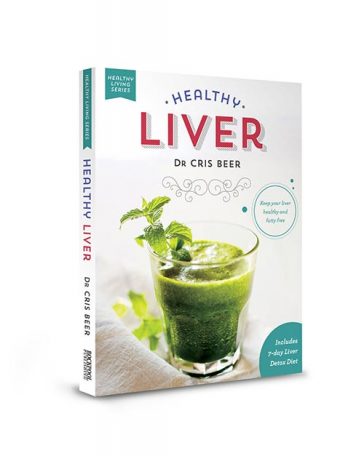Dubbed the ‘liver haters’, they are all relatively common, and it may really surprise you to know how much they can harm the liver over time.
With Dry July, the annual charity fundraiser now underway, we thought it only timely to take a closer look at just how damaging the impacts can be with the help of Dry July ambassador Dr Cris Beer.
The below is an extract from his new book Healthy Liver.
Toxins
A toxin is a substance or compound that can be stored in our body’s fat deposits and so can accumulate over a lifetime. Additionally, some substances that may not be toxic to the liver in small amounts can lead to damage if there is a large amount of that substance present in our system that the liver has to process.
An example of this is paracetamol, a common painkiller. If someone ingests too much paracetamol at once or over time, then this toxic compound accumulates in the liver and can lead to liver damage. In extreme cases, if a very large amount of paracetamol is ingested at once (twenty or more tablets) or repeatedly over a few days (at least ten or more tablets each day), liver failure and even death can occur.
Examples of toxins include:
- Industrial pollution
- Some pesticides, which can be residual on unwashed fruit and vegetables
- Some cleaning products
- Plastics e.g. bisphenol-A (BPA) found in some food storage containers, baby bottles and plastic toys, and plastic cutlery
- Cigarette smoke
- Recreational drugs
- Alcohol and caffeine
- Heavy metals e.g. mercury, aluminium, cadmium, lead and copper
- Many artificial food additives
- Certain medications such as paracetamol, and certain antibiotics and anti-fungal medications

Overload Agents – sugar, excess carbs, unhealthy fats and red meat
It is very easy to overindulge in today’s society where food is plentiful. This can easily overload the liver’s ability to breakdown and process food nutrients in addition to the other common substances in our diet such as caffeine and alcohol.
Those substances which can overload the liver are collectively called the ‘Overload Agents’, and include:
- Fructose – a type of sugar found in fruit, processed foods and cane sugar
- Refined carbohydrates – foods made with white flours, such as cakes, biscuits, pastries and muffins. Refined carbohydrates are essentially converted to pure sugar by the body anyway. Even gluten-free foods aren’t that healthy if made with certain types of flours such as white rice flour.
- Unhealthy fats – including trans fats found in some processed foods such as cakes and biscuits as well as excessive amounts of saturated fats found in animal products.
- Iron-rich foods – including excessive red meat and supplements containing iron. These are only potentially harmful if the liver is already inflamed due to liver disease as an inflamed liver will store extra iron. Too much iron in the liver can lead to liver cell damage. You can check your liver iron stores by a simple blood test known as a ferritin level as arranged by your local doctor. If this is higher than 200ng/mL for men or 150ng/mL for women then excessive red meat intake and iron supplements need to be avoided.
Micro-Organisms – viruses, bacteria in food poisoning
Certain organisms present in our environment can damage the liver by either directly attacking the body or via the chemicals the organisms produce as they die off. The nastiest organisms that can cause liver damage include:
- Blood-borne Hepatitis viruses – Hepatitis C and B (transmitted by blood and other body fluids)
- Food-borne Hepatitis viruses – Hepatitis A and E (transmitted via contaminated food)
- Food-borne bacteria – E.coli, salmonella, campylobacter. These are found in contaminated food such as undercooked chicken and can cause the symptoms of food poisoning. Avoid food poisoning by properly preparing and cooking raw meats, especially chicken.
- HIV
- Malaria
- Tuberculosis
- Epstein-Barr Virus (EBV) and Cytomegalovirus (CMV) – EBV causes glandular fever.
It is also believed that an imbalance in the gut flora that live normally in our digestive system can cause liver health issues through the toxins these organisms produce as part of their metabolic processes. One such organism is clostridium difficile, an overgrowth caused by long-term antibiotic use. Other organisms implicated in liver damage include streptococcus and enterococcus. These are also thought to be responsible for the creation of food intolerance symptoms such as bloating and abdominal pain.
It is important to restore proper gut flora balance in order to improve overall health and wellbeing as well as liver health.

Dr Cris Beer is a Dry July ambassador and author of Healthy Liver (Rockpool Publishing $29.99), now available at all good book stores and online







